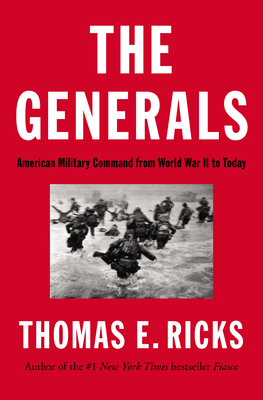This is the negative review of my book that Col. Gentile should have written

By
Major Tom Mcilwaine, Queen's Royal Hussars
Best Defense guest
book reviewer
This
[The Generals] is an extraordinary book which will be widely
read by serving officers. It raises some very interesting ideas, is fluent and
persuasive and provides a junior officer with all the ammunition they would
require to ask some very awkward questions of their seniors. That said I am not
certain that it deserves some of the extravagant praise that has been heaped
upon it (notwithstanding the fact that some of that praise comes from those
such as General Zinni who know more about the art of generalship in the
American military than I ever could).
There
are a number of reasons for this. There is the problem of Ricks's use of
military history. He certainly has breadth, but depth is perhaps absent in
certain areas and he appears to ignore context, particularly when discussing
the actions of the British in World War Two but also when discussing Vietnam. He
tends to rely on secondary sources which support his argument (such as Lewis
Sorley's recent hatchet job of Westmoreland) and chooses to ignore largely that
which contradicts his argument. On the rare occasions when Ricks does
acknowledge other points of view (such as Millet's assessment of Ridgeway) he
fails to provide an analysis of their opposing view, trusting instead that the
power of his writing will explain why he is right and the opposing view is
wrong.
Secondly,
for a book based around the idea that Marshall is the acme of military
perfection and American generalship, and supposedly based on research so
extensive that he even read Marshall's officer litter, there is surprisingly
little on why Marshall is so good. He never deals with the fact that Marshall
was badly wrong on the decisive strategic question of when to invade Western
Europe, or that he was also wrong on the subject of the African campaign. The
overall picture we are given is that of a superb selector of men (despite the
fact that so many of his selections had to be replaced) and developer of a
human resources system without parallel, which is fine as far as it goes, but
perhaps not enough to justify the extravagant claims made by Ricks.
This
leads onto the third and biggest problem with the book. Ricks's argument is
riddled with passages and chapters that directly contradict that which has come
before. So Marshall creates a superb system - but the system fails without him
- so is it really a system at all? Marshall's system values character over
intellect - which is precisely the flaw Ricks identifies in the selection of
modern general officers. MacArthur leaves no mark on the US Army - but
Westmoreland (who whatever his flaws certainly did influence the US Army) is a
creature in the MacArthur mold. Korea is a disaster because commanders lack
command experience in war - which doesn't seem to hold either Eisenhower or
Petraeus back. There are many more and this habit extends to his oral defense
of his thesis and to his much publicized view that moral issues are of less
importance than professional issues. When asked for something that Marshall
doesn't do well at a Q&A session at CGSC recently his first answer was his
treatment of African-American soldiers - a moral issue - not his misjudgment of
the timing of Overlord - a professional issue.
At
that at root is the problem with this book. At a shallow level it has much to
recommend it. An interesting topic, covered in just enough depth to provide
useful talking points at a dinner party. But for a keen field grade officer it
lacks depth, rigor, coherence and understanding. There is a superb book to be written on the
flaws of American generalship and how to improve it (although I would suggest
that on the whole American generalship is rather good) and such a book would be
of great value but this most certainly is not it. Having read this book and
heard Ricks speak, I would argue that he is not, and never will be, the man to
write it. Worse, by writing a book as
riddled with inconsistencies as this and by then promoting with such a
breathtaking lack of humility he has done exceptional damage to the reformist
cause which he allegedly supports.
Major Tom Mcilwaine is a British Army
officer who is currently a student at the School of Advanced Military Studies
at Ft Leavenworth. He has deployed to Iraq as a Platoon Commander and Battalion
Operations and Intelligence Officer, to Bosnia as Aide to the Commander of
European Forces and to Afghanistan as a Plans Officer with I MEF(Fwd).
Thomas E. Ricks's Blog
- Thomas E. Ricks's profile
- 436 followers



